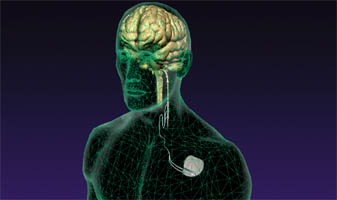
Stephen Simpson, CFA, Kratisto Investing (253 clicks)
Long only, growth at reasonable price, value, research analyst
Send Message| Follow (2,249)
Depression Likely The Biggest Incremental Driver For Cyberonics
Feb. 5, 2014 1:49 PM ET | About: CYBX, Includes: BSX, MDT, STJ by: Stephen Simpson, CFA
Disclosure: I have no positions in any stocks mentioned, and no plans to initiate any positions within the next 72 hours. I wrote this article myself, and it expresses my own opinions. I am not receiving compensation for it (other than from Seeking Alpha). I have no business relationship with any company whose stock is mentioned in this article. (More...)
This article was first released only to PRO subscribers. Learn More
Watching Cyberonics (CYBX) evolve over the years has been pretty compelling. I was part of a sell-side research team that covered the stock in the late 90s and early 00s and followed the company as it struggled to gain the acceptance of the FDA, physicians, and patients, not to mention overcome a particularly aggressive CEO. In more recent years, the company has settled into a solid growth trajectory driven by incremental market penetration and a very strong replacement cycle, while delivering impressive margins.
The question is what comes next. While I do believe the company's core addressable market in developed countries (epilepsy) remains significantly under-penetrated, I don't see that changing rapidly or dramatically. That puts even more significance on the under-developed opportunity in depression, where the company has only a limited opportunity to drive real change. Although these shares aren't all that expensive relative to other growth med-techs on the basis of multiples, it's going to take either accelerated penetration in epilepsy or upside in depression to drive a higher intrinsic fair value.
A Device-Based Approach To An Undertreated Disease
Cyberonics pioneered the use of vagus nerve stimulation (VNS therapy) to treat drug refractory epilepsy and it remains a market that the company essentially has all to itself in the U.S. Although epilepsy has been a recognized medical condition for quite some time, pharmaceutical companies have struggled to develop effective medications that don't also carry significant side effects or an impaired quality of life. With that, there are over 1.2 million people with epilepsy in developed markets (the U.S., EU, Japan and so on) that could benefit from the therapy offered by Cyberonics.
Cyberonics has developed a series of devices to deliver vagus nerve stimulation. In all cases the therapy involves a pulse generator (similar to a pacemaker/ICD) and a lead that connects the pulse generator to the left vagus nerve in the neck. The device can be implanted in an outpatient procedure (the generator is implanted in a subcutaneous pocket in the upper left chest) and it works by sending intermittent pulses of electricity to the left vagus nerve that reduce the frequency and severity of seizures. Physicians can adjust the therapy non-invasively, and patients can use a small magnet to manually adjust therapy if they sense an impending seizure.
How well vagus nerve stimulation works is a more subjective question than you might think. Clinical studies have shown that roughly one-quarter of patients see a 50% or greater reduction in seizure frequency after just one month, and more than one-third of patients achieve that level at one year. Side effects from the device are mild (hoarseness being the most common, and it usually improves with time) and the device can be removed when/if necessary.
Even so, the device does not often lead to a total cessation of seizures (about 10% to 15% of patients) and this is one of the more frequent complaints of doctors. While about 25% of patients drop out after the first implant expires (the devices last about five years on average), more than 90% of those who get a second implant stick with it thereafter.
Innovation And Replacements Drive Epilepsy
Acceptance of vagus nerve stimulation has never reached the levels that were hoped for in the 1990s, and this has historically been one of the bigger sources of volatility and complaint with the company/stock. Overall, Cyberonics has only penetrated about 5% to 6% of its theoretically addressable market, with double-digit penetration in the U.S. and some select European markets.
To its credit, the current management team of Cyberonics has guided the company in line with these market realities and has built a model focused around a strong replacement cycle (approximately 40% of revenue) and incremental value-added product development. On the replacement side, implants last around five years on average, with 3-4% annual price increases (and sometimes higher when there are meaningful advances).
In terms of new products, Aspire SR could be a very significant new product. It's going to be a couple of years before this product makes it to market in the U.S., but the device was designed with a "seizure response" feature that monitors the patient's heart rate and provides increased stimulation when it appears that a seizure is coming. The E-36 study has produced some encouraging data and good results in the E-37 U.S. study could not only drive FDA approval, but perhaps increased commercial/market acceptance as well.
New Markets Have Long Been Promising… And Difficult
For over 15 years now, Cyberonics has tried to develop additional market opportunities for VNS therapy. Drug-resistant depression was one of the earliest targets and although initial studies were not positive for the device, subsequent studies have shown a meaningful benefit for many patients who have not responded to drugs.
While the FDA has approved VNS therapy for depression patients who have not responded to at least four drugs, the company has been stymied thus far in securing adequate reimbursement. Cyberonics continues to work on this, and is trying to get the CMS to reconsider its coverage for a subset of seriously ill patients. This subset includes about 70,000 patients in the U.S. alone and could represent $1.5 billion in potential revenue but getting payers to go along has been an uphill battle for some time.
Among other potential indications, Cyberonics is also pursuing the possibility of VNS therapy as a treatment for congestive heart failure. Pilot study data are due later this year, but it's hard not to be skeptical. Device-based interventions for CHF have a pretty poor history, as only a limited subset of patients have responded well to the cardiac resynchronization therapy approach pushed by Medtronic (MDT), St. Jude Medical (STJ), and Boston Scientific (BSX).
This pilot study is targeting patients with Class II/III heart failure, which overlaps with the CRT market addressed by Medtronic, St. Jude Medical, and Boston Scientific. These companies have all been working on getting more usage in Class II patients (the higher the class, the worse the condition), as only about 20% to 30% of Class III patients are good candidates (and about 30% of patients don't respond to CRT therapy).
BioControl Medical has already shown that vagus nerve stimulation may be a productive approach - a small two-stage study saw patients getting VNS migrate from a distribution of 47% Class II, 47% Class III and 6% Class IV to 34% Class I / 48% Class II / 17% Class III and 43%/43%/13% at 6-month and 12-month follow up, respectively. There were also significant improvements in exercise tolerance and quality of life.
Unlike CRT from Medtronic/Boston Scientific/St. Jude, the approach being explored by Cyberonics and BioControl involves restoring or augmenting parasympathetic function and works on the autonomic nervous system instead of stimulating/shocking an already damaged heart. This opportunity could address over 1 million patients (and perhaps 2 million or more) and at an ASP of $15,000 or so, the numbers get very large very quickly ($15 billion-plus at 100% penetration). Were this approach to show solid clinical efficacy, I would not be surprised to see Cyberonics partner with Medtronic, St. Jude, or Boston Scientific or receive a buyout offer.
A Little Competition May Not Be A Bad Thing
Although many key patents on VNS therapy expired in 2011, Cyberonics has seen little direct competition. Neurotech and Cerebral Rx have CE-marked VNS approaches, while Medtronic and St. Jude have been more interested in pursuing deep brain stimulation for epilepsy and depression. NeuroPace has advanced its RNS System (Responsive Neurostimulator System) and it has shown better seizure reduction at one-month and one-year periods, but it requires a cranial implant (brain surgery) and more complicated programming.
Odd as it may sound, getting a major player in neuromodulation like Medtronic, St. Jude, or Boston Scientific to get involved in vagus nerve stimulation wouldn't necessarily be the worst thing for Cyberonics. Market/doctor acceptance is still a major issue and the marketing muscle of one of those companies could bring some much-needed attention to the therapy. Given that these companies have all pushed other therapies (in different therapeutic areas) in the past with even weaker efficacy profiles, I do find the lack of interest in vagus nerve stimulation to be interesting.
The Bottom Line
I am not modeling significant uptake in depression at this time, leading me to project roughly 9% long-term annual revenue growth on the strength of additional market penetration in epilepsy and ongoing replacement sales. That supports an intrinsic fair value in the $50s today, with an EV/revenue approach (using a 6x multiple that is consistent with growth med-tech) suggesting a mid-$60s target price. Were Cyberonics to achieve 5% share in depression in the U.S. (of that 70K patient subset), the DCF-based fair value would move into the $60s, but it would take more than 10% share to get to the current average sell-side target price of almost $76.
I realize that growth med-tech stocks trade on revenue growth and revenue multiples and rarely on margins or FCF. With that, an unexpected improvement in market penetration or positive news on reimbursement in depression would certainly be good for the stock. I'm not fond of owning stocks trading above what I believe to be intrinsic fair value, though, so I don't anticipate adding these shares to my own portfolio in the near term.
http://seekingalpha.com/article/1996061-depression-likely-the-biggest-incremental-driver-for-cyberonics.






